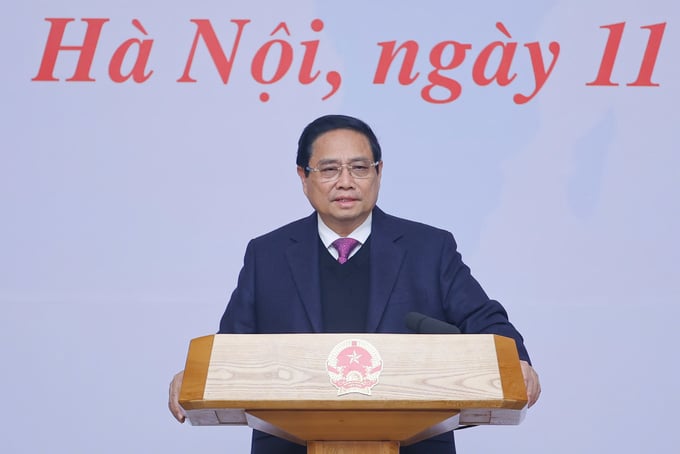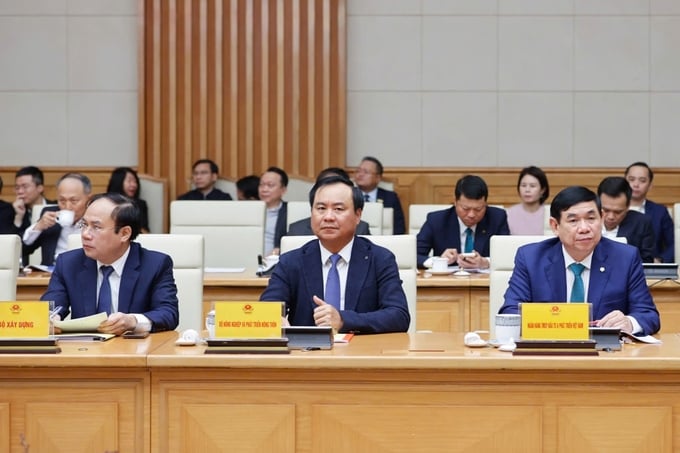November 28, 2025 | 04:34 GMT +7
November 28, 2025 | 04:34 GMT +7
Hotline: 0913.378.918
November 28, 2025 | 04:34 GMT +7
Hotline: 0913.378.918

Prime Minister Pham Minh Chinh chaired the conference of the Government Standing Committee with commercial banks on the morning of February 11. Photo: Nhat Bac.
On the morning of February 11, Prime Minister Pham Minh Chinh chaired a conference of the Government Standing Committee with commercial banks to accelerate growth, make breakthroughs, and control inflation. Representing the Ministry of Agriculture and Rural Development (MARD) at the meeting was Deputy Minister Vo Van Hung.
Speaking at the conference, Deputy Minister Vo Van Hung emphasized that the agriculture and rural development sector needs special policies to promote innovation, enhance productivity, improve quality, and increase the competitiveness of agricultural products.
The agricultural sector leader also reiterated the need to transform the agricultural sector towards green growth, sustainable development, and higher added value while contributing to environmental protection and climate change adaptation, as outlined in Resolution 19-NQ/TW.
To achieve these goals, the Deputy Minister of MARD stated that credit policies play a crucial role as a driving force, enabling farmers, cooperatives, and enterprises to confidently invest in smart and modern agricultural production models.
Therefore, he proposed developing a specialized credit mechanism to encourage businesses and farmers to apply scientific and technological advancements, promote digital transformation, and build a sustainable agricultural sector.
Specifically, Deputy Minister Vo Van Hung put forward five proposals, with the first being the establishment of a specialized credit mechanism for businesses and cooperatives investing in green agriculture, circular economy practices, and deep processing.

Deputy Minister of MARD Vo Van Hung attended the conference of the Government Standing Committee with commercial banks on the morning of February 11.Photo: Nhat Bac.
Second, expand preferential credit for projects applying high technology and digital transformation in agricultural production.
Third, strengthen green credit packages and unsecured credit for sustainable agricultural production models.
Fourth, establish a dedicated credit guarantee mechanism for agricultural cooperatives, helping them access capital more easily.
And finally, promote microfinance to support farmers and small-scale producers in accessing capital conveniently.
Earlier, leaders of MARD highlighted key achievements in collaboration between MARD, the State Bank of Vietnam, and commercial banks, which have helped develop and implement effective credit policies.
For example, preferential credit policies for high-tech and organic agriculture have facilitated the development of clean, safe, and sustainable production models.
Additionally, loan programs have supported cooperatives and businesses investing in agricultural processing and preservation, enhancing the added value of Vietnamese agricultural products.
Alongside these efforts, credit packages have been introduced to support the restructuring of the fisheries, rice, and fruit sectors, ensuring sustainable supply chains and promoting digital technology in agricultural credit, making it easier for farmers and cooperatives to access funding.
However, challenges remain, such as complex loan procedures, the limited financial capacity of many cooperatives, and market fluctuations that impact farmers' ability to repay loans.
Translated by Kieu Chi

(VAN) On November 27, in the meeting with Minister Tran Duc Thang, Mayor Yin Yong shared Beijing’s experience to improve environment and air quality.

(VAN) After 30 years, both sides identified strategic areas of cooperation: sustainable production, increasing coffee value and training for farmers.
/2025/11/27/4910-4-164708_294.jpg)
(VAN) On the afternoon of November 27 in Beijing, Minister of Agriculture and Environment Tran Duc Thang held a working session with several major Chinese enterprises operating in the agriculture and environment sector.

(VAN) The Department of Animal Health issued a provisional guideline requesting local authorities to increase surveillance, collect samples for testing, and conduct epidemiological investigations according to the established procedure.

(VAN) The United Nations recommends that Vietnam utilize data and artificial intelligence to enhance early disaster warnings and reduce GDP losses by 3.2% in the context of climate change.

(VAN) On the morning of November 27 in Beijing, Minister Tran Duc Thang and the Deputy Commissioner General of the General Administration of Customs of China signed a protocol on fresh jackfruit exports.

(VAN) As floodwaters recede, a vast network of irrigation works across eastern Gia Lai is emerging in a state of severe disrepair, with extensive damage demanding urgent restoration ahead of the 2025-2026 winter-spring cropping season.